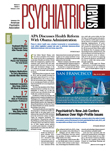Federal spending on Medicare and Medicaid will rise from about 4 percent of gross domestic product in 2009 to nearly 6 percent in 2019 and 12 percent by 2050.
Most of that increase will result, however, from rising per-capita costs rather than from the aging of the population.
That projection comes from a comprehensive report by the Congressional Budget Office (CBO) outlining the urgency of health system reform, the pros and cons of various health reform proposals, and the obstacles they will encounter.
The report, “Key Issues in Analyzing Major Health Insurance Proposals,” focuses on large-scale proposals, provides extensive background information, and explains the CBO's analysis of numerous issues that could arise should the Congress seek to enact major changes in the health insurance system.
“Without changes in policy, a substantial number of nonelderly people (those younger than 65) are likely to be without health insurance,” said Robert Sunshine, acting director of the CBO, in a Weblog he writes called the Director's Blog. “CBO estimates that the average number of nonelderly people who are uninsured will rise from at least 45 million in 2009 to about 54 million in 2019,” according to Sunshine.
“Those problems cannot be solved without making major changes in the financing or provision of health insurance and health care. In considering such changes, policy-makers face difficult trade-offs between the objectives of expanding insurance coverage and controlling both federal spending and total costs for health care.”
For instance, Sunshine noted that serious concerns exist about the efficiency of the health care system, but no simple solutions are available to control the growth of health care costs. Steps to restructure the insurance market and to encourage people to purchase less extensive coverage could reduce the use of treatments that provide minimal benefits, but enrollees would face higher cost sharing or tighter management of their care, he wrote.
“In many cases,” he added, “the current health care system does not give doctors, hospitals, and other providers of health care incentives to control costs. Significantly reducing the level or slowing the growth of health care spending would require substantial changes in those incentives.”
The CBO report is posted at<www.cbo.gov/ftpdocs/99xx/doc9924/12-18-KeyIssues.pdf>. Robert Sunshine's Director's Blog is posted at<http://cboblog.cbo.gov>.▪
